Hey there, friends!
AI is all the rage these days, and while I’m a fan of tech that makes life smoother, I’ve been pondering a curious conundrum. Is there a cost to all this convenience? Dive in with me as we explore the potential pitfalls of over-relying on AI and possibly, just possibly, stifling our innate thinking powers.
When AI Takes the Front Seat
AI's ubiquity, from voice assistants to predictive text, is undeniably impressive. But as with most good things, moderation is key. Here are some of the reservations I've been contemplating:
Surrendering Critical Thinking
As AI solutions hand us answers on a silver platter, we risk sidelining our critical thinking muscles. Like that time, I blindly followed my GPS into a dead end. Why? Because it said so. Lesson learned: AI is a tool, not an infallible oracle.
This became really apparent to me while journaling in the morning. I've been writing my morning pages now consistently, and it becomes more and more easy. Today, I felt like all I was doing was recording my thoughts. It was effortless, almost as if I had tapped into my own personal generative AI agent in my brain. It made me realize that our brains are incredibly powerful and capable of generating ideas and insights on their own. While AI can help us in a variety of ways, it's important to keep in mind that technology shouldn't overshadow or undervalue our own cognitive abilities. Our minds have the potential to be creative and innovative without solely relying on external tools. Relying on AI is easier as it is hard to think, but it might also make our abilities atrophy.
Loss of personal touch
Personal connections matter. Whether it's a handwritten note or a thoughtful gift, it’s the thought that counts. Automated messages or AI-generated gifts might be efficient, but they might lack that personal warmth. Remember the last auto-generated birthday wish you received? Yep, it probably felt a tad robotic. I feel this happen whenever I see a celebratory LinkedIn post and nearly everyone has just clicked the suggested 'auto response'. It's disappointing to see the lack of genuine engagement and personalization.
Overdependence and vulnerability
Relying too heavily on AI can create a dependency, and what happens when the tech fails or gets it wrong? Overdependence on AI can lead to a loss of critical thinking skills and the ability to problem-solve independently. Additionally, relying solely on technology for important tasks can leave individuals vulnerable to security breaches and privacy concerns.
Privacy Concerns
The more we integrate AI into our lives, the more data it requires to function optimally. This can raise red flags about personal privacy. After all, nobody likes the eerie feeling that they're being constantly watched or analyzed. Furthermore, as AI systems become more advanced and capable of processing vast amounts of personal data, there is a heightened risk of this information being misused or falling into the wrong hands. This can result in potential identity theft, unauthorized access to sensitive information, or even manipulation of personal data for malicious purposes.
Potential skill atrophy
Remember the joy of solving a math problem without a calculator or reading an actual map? As we delegate tasks to AI, we might be letting some of our own skills rust. The thrill of working out a challenge using just our brains Priceless! Relying too heavily on AI for problem-solving and navigation can lead to potential skill atrophy. By constantly relying on technology, we may lose the ability to think critically and solve problems independently. This could hinder our cognitive development and limit our capacity to adapt to situations that require human intelligence. It is important to strike a balance between utilizing AI's capabilities and maintaining our own mental agility.
Conclusion
AI is undeniably transformative, but as with all tools, its use requires balance. In our pursuit of convenience, let’s not inadvertently mute our innate curiosity, creativity, and critical thinking. After all, our human touch, intuition, and ingenuity are irreplaceable.
Your Actionables:
- Take tech breaks. Spend a day without voice assistants or predictive technology. Rely on your intuition and skills.
- Engage in activities that foster critical thinking and creativity—scratches, reading, or even a tech-free chat with friends.
- Reflect on how you use AI. Ensure it's a tool for empowerment, not a crutch that makes you complacent.
Until next time,
Regina

